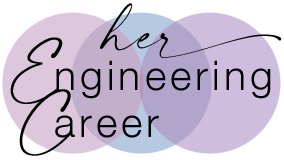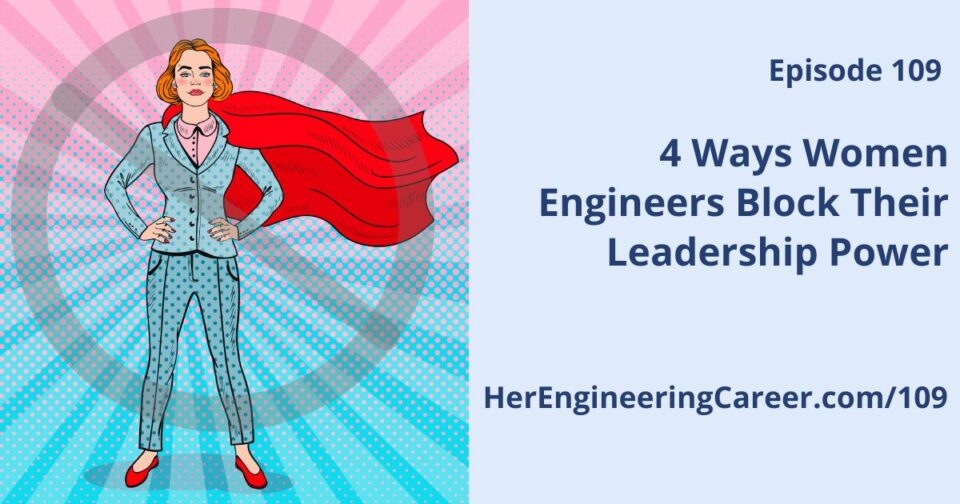Episode Transcript
Think about your engineering career so far. How it has evolved and how you have advanced. And about how you’ve developed your personal power.
And now think about your career path ahead. Think about the roles you want to take on next and how your power will play into that.
About how your power can assist you in making an impact as an engineer and leader.
You need power to succeed in your engineering career. But I’m betting you’re not comfortable with that.
Because all the messages you’ve gotten throughout your life say that power is bad.
Power implies coercion or intimidation or oppression. It sets up a status system that pits people against each other.
To be powerful means you have to control and dominate and throw your authority around.
But what you’re thinking of is abuse of power. Actually, when used appropriately, power is useful and necessary for leadership.
You need power to succeed as an engineer and leader.
Let’s explore different types of power. And some tendencies to watch out for as you develop power as part of your career strategy.
Types of Power Available to You in Your Engineering Career
There are many types of power in the engineering workplace. You’ve likely seen versions of all of them.
Some people have power because they’re overbearing and intimidating. Although coercive power does have its place, this is mostly negative and unproductive power.
Some people have power because they’re naturally attractive physically or personality-wise. They have charisma.
Other reasons you might have power are because
- You have the means to reward people.
- You have a strong network with all the right connections.
- You have command of the language or control of the agenda.
- You’re in close proximity to another powerful person in the organization.
Common forms of power you’ll run into as an engineer are expert power, position power, and informational power.
- Expert Power: Your engineering expertise sets you apart. It gives you power because you have amassed knowledge and experience that others don’t have in a particular area of interest.
- Position Power (also called formal power): The position you hold – and the authority or rank that goes along with it – give you power relative to others in the organization or community.
- Informational Power: You have informational power whenever you have intelligence or news or data that others don’t have yet. It can give you leverage for competitive edge or negotiation.
Most of these power types are available to you. You can choose how to incorporate them into your career strategy. Focusing especially on those that align with your skills and strengths.
The Power-Averse Tendencies of Women Engineers
If you tend to be power-averse in your career, you’re not alone. Turns out this is not an uncommon thing for professional women.
In fact there are 4 power-averse tendencies women engineers have. 4 ways women block their leadership power:
- Avoidance
The first is avoidance. It stems from the notion that power is bad, like we talked about earlier. But also from the idea that women are not allowed to want what they want.
So you tend to tell yourself you don’t have enough power to do what you want to do. And you avoid opportunities that have more power.
It’s that scarcity mindset that says you need to diminish your desire to have power and to lead. That you can’t aspire to be more and have more in your career.
This is wrong. And that mindset needs to change.
- Readiness
The second tendency is readiness. You tend to think you’re not ready to lead.
You tend to think you need more preparation or study or experience or power before you can be a leader.
When in fact, you are as ready as you need to be. You don’t have to know everything about being a leader before you step into a leadership role.
If you did know everything, you’d be overqualified. You’d be bored with the opportunity.
- Reluctance
Women generally have a reluctance to lead. Even very powerful women often have a reluctance to lead.
Maybe you’ve experienced this. You hesitate to fully step in or step up. And it’s hard for you to totally let go of previous work.
It’s hard to focus on your new leadership responsibilities while delegating or leaving the rest to others.
You feel like you’re dropping the ball on your previous position and you feel unworthy of the new position. Both at the same time.
Here’s the good news: You’re a capable leader. And you want to lead. So once you complete the transition to your new leader position, you’re immediately in alignment. You feel your power and use it well.
- “Inter-fear-ance”
The 4th tendency is what I call inter-fear-ance. Allowing your fear to take over and keep you from standing in your power.
Inter-fear-ance shakes your confidence. Leaving you feeling less-than and incapable. It makes you uncomfortable with risk. It keeps you from fully embracing your leader role.
In previous episodes we’ve talked about many ways to build confidence, risk-tolerance, and leadership skills.
You may want to go back and listen to
- Episode 101 on career sabotage
- Episode 93 on higher confidence
- Episode 70 on getting noticed for your leadership skills
- Episode 35 on raising your risk tolerance.
A Power Strategy for Your Engineering Career
Now you’re aware of the different types of power and what power-averse tendencies to watch out for. So you can put together a strategy to develop your power and incorporate it into your career vision.
I’d love to help you with that. Whether you need a quick strategy session or a more comprehensive look at your career strategy overall through my signature program, I’m here to help.
Power is not something you wield. But rather it’s an energy that others feel as you lead them.
To use your power appropriately means to develop and lift the power of others while working toward your organization’s mission.
It means realizing your career vision. And living and working in alignment with who you are.
Next time on Her Engineering Career Podcast I’ll share with you the best qualities of my favorite engineering leaders. Be sure to tune in for Episode 110.

